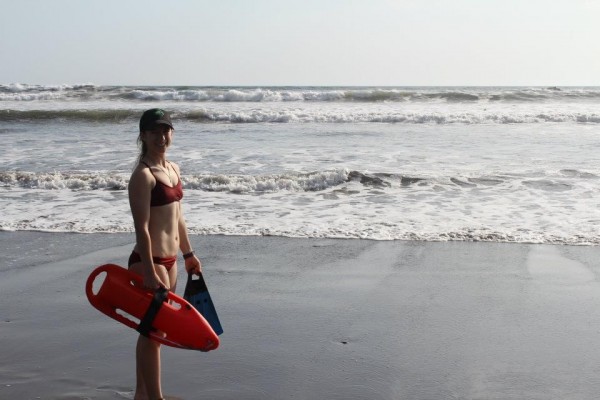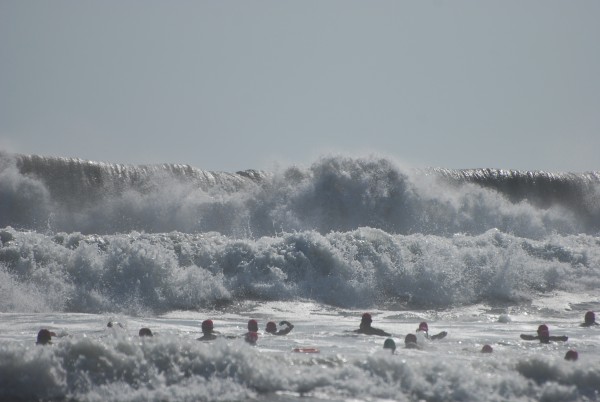Featured Volunteer: Elisa Finan

I first heard about ISLA from a lifeguard I work with at Huntington State, Leo Oorts. I was most interested in ISLA because they go around the world to help develop lifeguarding. There are so many places that don’t have lifeguarding programs and need them, and programs that lack up to date techniques.
Many countries can’t afford to pay for the proper services and equipment, through ISLA we provide and help to save lives all over the world. ISLA also provides opportunities for all lifeguards to share our knowledge and to help guide other lifeguards. I had previously lifeguarded in Australia for a summer, and the experience broadened my skills as a lifeguard. Knowing the many benefits of ISLA, I hope to continue to volunteer and to continue to spread lifeguarding and education to many places around the world.
During my time in Nicaragua, I helped out with the lifeguard training session at El Transito and lifeguarded during Semana Santa at Jiquilillo. My favorite memory of Nicaragua was during the lifeguard training at El Transito. We were taking the trainees out in the surf as part of a swimming exercise. And at the time, the surf happened to be pretty big…ten feet. We weren’t going to take the trainees out too far, but while we were waiting for everyone to catch up, we drifted into a rip that took us out a good ways. So we decide to swim everyone in. No problem right? Well, then the sets started to pick up and the surf hammered the guys. Waves were crashing and you could only see the tops of their heads. Pink Beanies were scattered everywhere. And I mean everywhere. But it was great because everyone made it back in safely and the trainees got to experience big surf. They all got the courage to realize that even though the waves might be big, they can get through it. They were presented with a challenge, and they were able to overcome it. The grins they had back on the beach were awesome. It was the best “thank you” they could have given us. After that day, all of us instructors felt like we had really done something for them during training.

Spending time in Nicaragua reminded me not to take the equipment and resources available in the United States for granted. We have advanced life support (ALS) readily available for us within five to fifteen minutes when we are on the beach. But in Nicaragua…you’re pretty much it. If it’s not a serious life threatening situation, they don’t go to the hospital, even if they still may need medical attention. In the U.S., if there is a C Spine Incident, we recommend getting x-rays to confirm that there is not damage. Out there, if they’re not paralyzed, that’s it, they just walk away.
The most surprising thing about the trip was the techniques. There are a few rescue and medical techniques they still use today for lifeguarding that…well, I wouldn’t recommend. My favorite was the sting ray treatment. We were told that if there was a sting ray wound, a person in the town will take a hot burning rod from a fire and shove it into the puncture wound to cauterize it. OUCH! I’ll take the bucket of hot water, thanks…
We met a lot of amazing people during our trip. There was this one guy “Brocha” that had been volunteering for Cruz Roja for over thirty years. During the lifeguard training course, he wasn’t the fastest at the events but he always finished it running. He always came out of the water giving it his all. When Tyler and I were talking to him we asked him “why do you volunteer?” and he just looked stunned as to why we would even ask. He replied “because the Cruz Roja help people. And here in my country…there are a lot of people that need help.” Tyler and I both walked away from the conversation realizing that we may be miles away, but we are the same people. We all volunteer to be a part of a movement that helps others.
It’s fun to see other places and see how they lifeguard, and to see their history of lifeguarding. Meeting other lifeguards in other countries is cool too, because I feel that even though the language and culture of the country is different than home, the lifeguarding culture itself is the similar. It’s the same good humor that circulates here at our beaches. Lifeguarding around the world has allowed me to see many things and meet many people. I told myself I’d see the world by doing a job that would allow it. Lifeguarding has definitely taken me places.